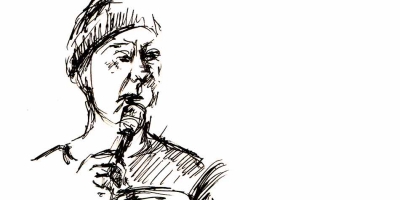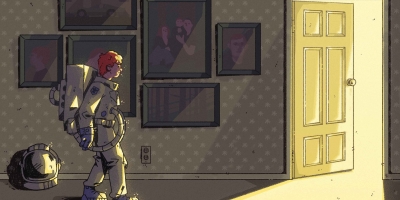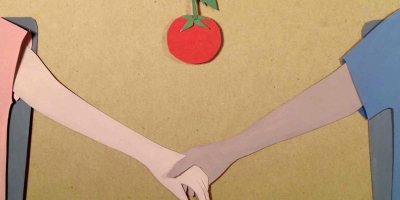In Conversation with
Irvine Welsh
by Dmitry Samarov

Irvine Welsh doesn’t need much of an introduction. His work is that rare case that proves success does not have to equal the lowest common denominator. He manages to write about serious and complicated human issues with humor and without talking down to his audience. Prior to his new book—which is set in Miami—I’d read Trainspotting and Skagboys, which both follow the adventures of a bunch of guys in Edinburgh, Scotland. No matter how low any of them get, no matter how utterly they manage to foul up their lives, Welsh manages to keep them from becoming caricatures and keeps us, his readers, from sinking into the mire of their bad decisions. He somehow maintains a positive outlook through it all and that’s something of a miracle given the straits his characters find themselves in.
I met Welsh a year or two ago through Twitter, not long after learning, to my surprise, that he lives in Chicago like I do. I asked for his address so I could send him a copy of my book. He suggested we meet for a beer instead. He showed up at a bar in Wicker Park with three healthy-sized, signed hardcovers to exchange for my one little book. We’ve been meeting regularly for coffee or movies at the multiplex or fight nights at Horseshoe Casino ever since.
Welsh was born in Leith, the port area of Edinburgh, into a working-class family. After stints in punk bands, as a home renovator, as a house-music DJ, and as sundry other occupations and pursuits, he published his first novel Trainspotting in 1993. It was turned into a world-renowned film directed by Danny Boyle in 1996. He has since published six other novels as well as numerous screenplays, stories, and reportage. He’s an instantly recognized figure in most of the capitals of Europe, as well as in New York and LA, though he has some measure of anonymity in his current hometown of Chicago.
He agreed to answer a few questions while touring in support of The Sex Lives of Siamese Twins, which has just been published in the US.
Dmitry Samarov: You’ve talked elsewhere about the two main characters in The Sex Lives of Siamese Twins representing two ways of being that you wanted to reconcile, that jocks and artists don’t necessarily have to be polar opposites. Do you think it’s society that encourages this kind of division, or are they contrary human tendencies we must reckon with?
Irvine Welsh: I think both. We are always going to be more inclined towards one rather than the other, but everybody is arty and sporty to some extent, and society has organized against that. It always thrives on division. If everybody had time to play some sport or draw or write, there would be no need for self-help books and psychotherapists.
Samarov: Slang and colloquial speech have been an important part of your work. Do you think anything is lost or gained when characters like Lucy and Lena in Sex Lives don’t speak the way, say, Begbie from Trainspotting does? Do you feel any less connection or identification with people from very different backgrounds than your own in your books?
Welsh: Not really. You have to represent the characters in the place you are writing about. The themes I’m addressing in Sex Lives are just more appropriately told by young American women in Miami than guys in Scotland, so you have to go with it and forge the appropriate tools for the job.
Samarov: You primarily work in fiction, be it novels, stories, or screenplays. Do you feel that essays, reportage, and other nonfiction forms restrict the kinds of themes or ideas that you like to explore?
Welsh: Yes. I do bits of journalism, but I don’t really have the head for it. With journalism, you are finding truths to tell lies; with fiction you are using lies to find a deeper truth. That’s way too simplistic, of course, but there is something in it.
Samarov: You’ve set two books in Miami now but none in Chicago. You’ve said that Chicago is a more defined place and that other writers like Nelson Algren, Don DeGrazia, or Joe Meno know it far better than you. Can you imagine that ever changing and wanting to write about the place?
Welsh: I probably can, now that I’ve been here longer. I think by a process of immersion it becomes less intimidating to write using a city as a backdrop. Characters and stories are fairly universal—it’s only really the intonations that vary. I’m starting to pick up more on Chicago’s.
Samarov: Chicago’s a good place for you to keep a lower profile than the British Isles. Do you ever miss being recognized on the street here the way you would be in London?
Welsh: No, I don’t miss it at all. It’s nice to be anonymous, and it’s important for a writer. That’s part of the attraction living in the States. Unless I go into a few hipster bars in Logan Square or Pilsen, nobody knows who I am, and it’s brilliant. I think a lot of artists have an exhibitionist and introverted streak—it’s good to indulge both. I love going out and meeting people and having fun, but I couldn’t live like that 24/7.
Samarov: I know you’re a huge sports fan, be it football, tennis, boxing, even baseball. Would you consider setting a whole book in that world, or is following your favorite teams a way to get a break from the business of literature?
Welsh: I think it’s the second, so I don’t know if I could sustain a book in any one sporting world. I have people going to football, boxing, etc., but I doubt I could set a whole novel or even a story strictly in that domain.
Samarov: You seem to me to be a guy who’s figured out a good balance between work and play. Of course, your success couldn’t have hurt, but did you ever have a full-on tortured artist phase? Or do you think that’s something to be overcome through discipline?
Welsh: I never haven’t had a full-on tortured artist phase! I think you figure out that it’s simply all about work and putting in the hours. That’s a drag to hear when you’re younger, so you spend a lot of time looking for shortcuts that don’t exist. If you have a writing problem, you just have to spend time thinking about it, and perhaps looking at what other people have done to resolve similar issues. I never worry about it, I know I’ll find a way through it or ‘round it.
Samarov: I’m looking forward to your next book, A Decent Ride, because of the cabbie angle. Can you talk a bit about how that one came about? Is it a return to the familiar cast of Edinburgh characters from your earlier novels?
Welsh: The main character, Juice Terry, came from a novel I wrote called Glue. He resurfaced in Porno, and then again in a novella called I Am Miami. So he keeps coming back. He’s one of my favorite characters, because he’s always upbeat no matter what life throws at him. He’s obsessed with sexual encounters with women, and has a strange but compelling view of the world.
Samarov: You’ve told me about other upcoming projects—the electronic dance music TV show, the Spring Breakers sequel, the Ivanhoe adaptation, among others. Can you talk about where these are at, process-wise? Do you use these collaborations as a way to counterbalance the solitary work of book-writing?
Welsh: The best way to make sure a movie or TV project never happens is to talk about it. I reckon one in ten things I’ve been involved in has gotten made. It’s an enormously fraught and long undertaking: both Filth and Ecstasy took fifteen years to see the light of day. There are just so many people involved, and they all need to say “yes” at the same time. I see them as essentially life projects—they are just things you chip away at and hope they get realized. That’s why it’s so important to work with people you like, because you could be in each other’s lives for some time. The trick is to enjoy the process rather than sweat about the output. It’s easy for me to say that, as I always have the books to go back to, where the writer is completely in control of his own destiny. But that can also get lonely.
Samarov: I’ve watched you give readings and talks, and you seem very comfortable on stage. Have you always been? Or has it taken work to make it easier? Do you enjoy the performance aspect of the literary racket, or is it just a mean for promoting the books?

Welsh: I’ve always felt pretty comfortable. You grow up in a storytelling culture in Scotland, so you’re used to getting up at parties or holding court in the pub. I just see it as an extension of that. Having said that, I’m not keen on going to that sort of event myself. I feel I engage with storytelling better in a less formal atmosphere.
Samarov: The live literary scene in Chicago seems to have really ramped up over the last few years, to the point that you could easily go to a different storytelling/reading event any night of the week here. Do you have favorite shows? And to what do you attribute this phenomenon, and is it comparable to other cities you’ve spent time in?
Welsh: I think it’s a Western phenomenon. We are obsessed with creativity. We’ve gone from wanting to understand society to make it better (the ubiquitous social-science degree) to understand business to make money (the MBA) to understand creativity to self-actualize (the MFA/art school thing), and I think readings are a part of that. So on one level it’s positive, but it also comes from a narcissistic fear-of-mortality culture.
Samarov: In addition to your work as a writer, you were seriously involved in last year’s Scottish Independence referendum. Do you anticipate doing more work in that area in the near future?
Welsh: I feel passionate about how the politics and privilege of the entrenched elites in the UK has let everyone in Britain down and ripped us all off. Scottish independence, to me, is an important aspect of that, but it’s only one. We’re looking at nothing less than a renewal and further advance of democracy. It’s important to realize that there are generations in the West who have nothing to look forward to but debt and servitude, and that just isn’t acceptable.
Samarov: You and I met on Twitter, then developed an actual friendship. Has that happened to you often on social media? Have you been burned by people online who’ve taken advantage of your openness and generosity?
Welsh: I’ve met a few people on Twitter, but they always tend to be friends of friends. I think it enhances the natural process people have of inheriting their friends’ friends. In our case, we had people like Steve Jones, John McNaughton, and Tony Fitzpatrick in common, and Chicago is such a village, so a lot of people in arts/music/writing/film/etc. are all pretty much one degree of separation away from each other. I don’t think making friends with complete strangers online is a brilliant idea—it’s never really appealed to me.
Samarov: We both like going to movies, yet it seems like more and more of the really worthwhile-filmed storytelling is shifting to series of various kinds. Can you envision a time when movie theaters are just for dumb popcorn fare and anything with any heft to it will be watched at home, behind closed doors?
Welsh: To an extent, that’s where we already are. It’ll be increasingly hard for anything other than the franchise blockbuster sequel to find room in the multiplex. But the multiplex will itself be under threat from home cinema and the quality premium-cable show, just as much as the art-house or rep theater. I think there will continue to be a space for cinema, as watching a movie, for me and many other people, is enhanced as a social experience. Even a shit movie in a cinema is somehow bearable compared to a shit movie at home.
Samarov: This is a time when there are unprecedented ways for us to distract ourselves and not focus on our actual lives. Technology enables us to quantify, chart, measure, record, and comment on every scintilla of existence while at the same time allowing us not to really participate. Do you have any sense whether we’re headed toward some sort of breaking point with this stuff? Virtual reality? A return to some sort of retro Stone Age maybe?
Welsh: I love social media, as it’s politically enabling. But I also think the technology is psychologically damaging to us. I really think we will see self-help courses on “how to ration Twitter,” “how to live without your phone switched on,” etc., etc. In fact, they probably already exist. Online.





